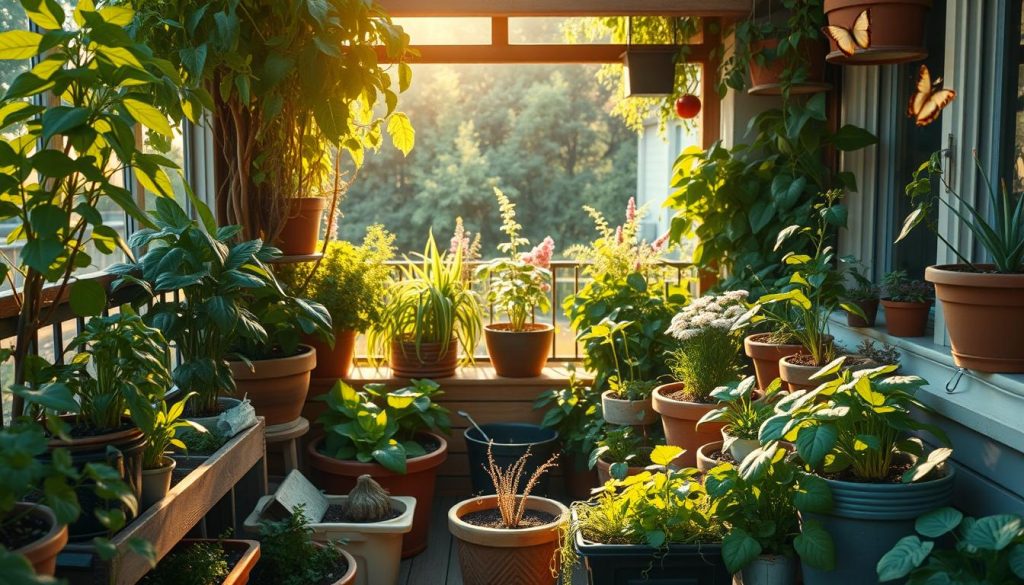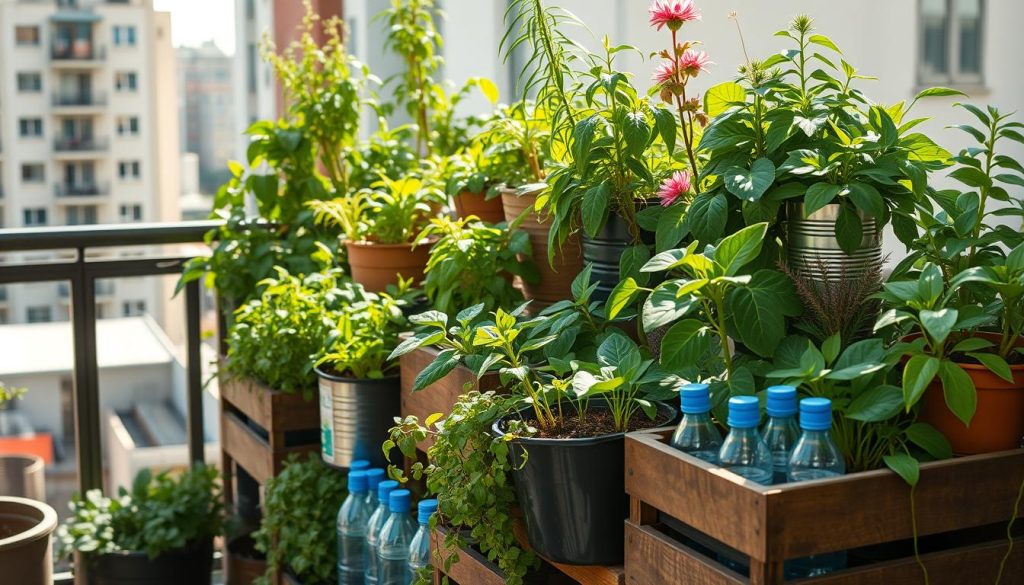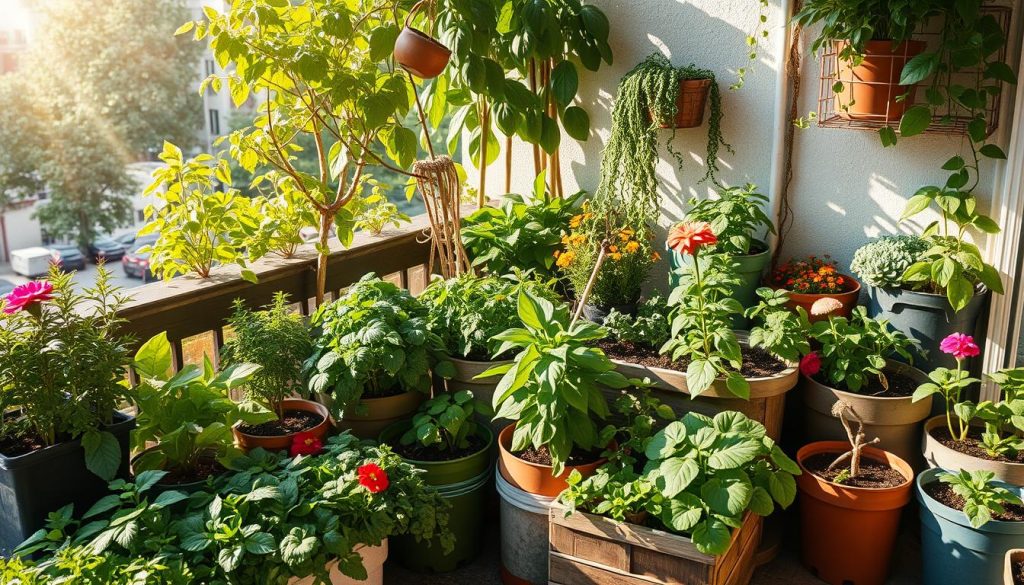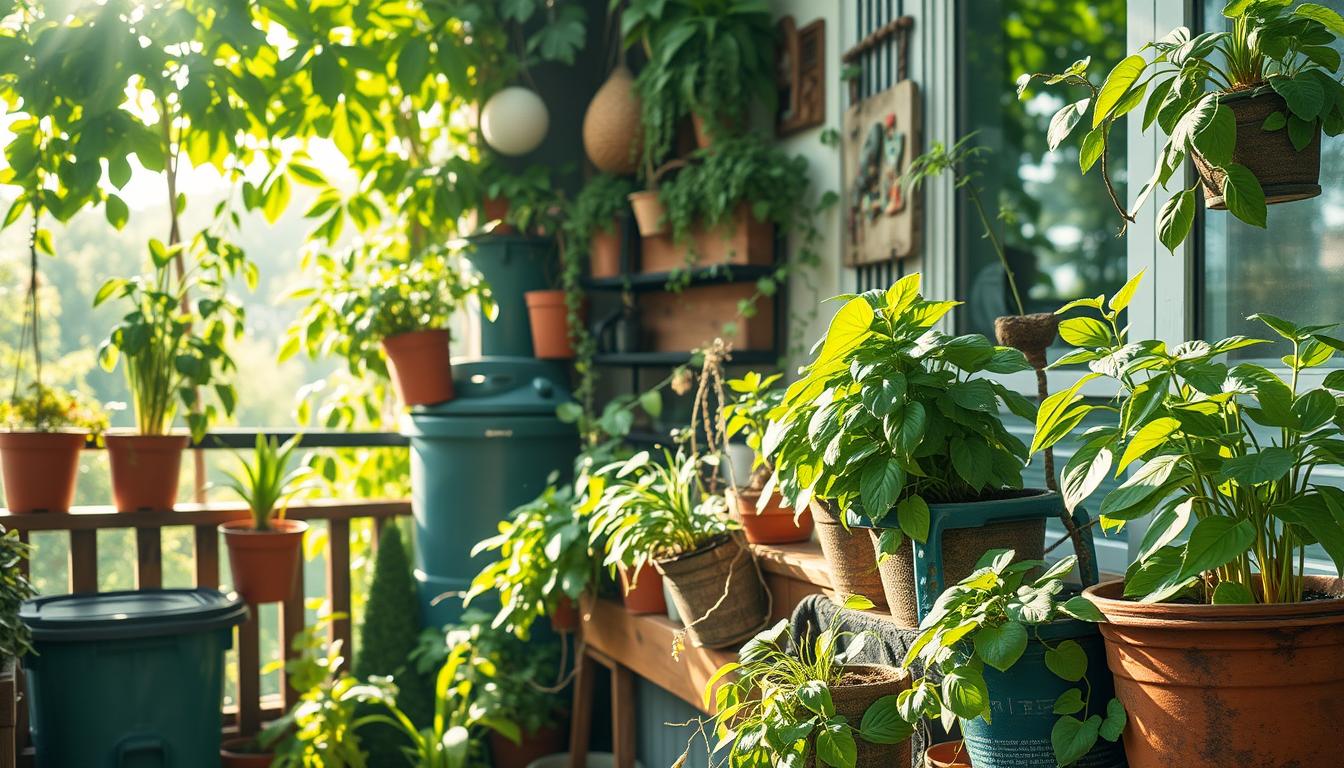I’m thrilled to share my journey to a zero-waste balcony garden. It’s not just about growing plants; it’s about living sustainably. Starting a zero-waste garden in a small space is key.
Creating a zero-waste balcony garden has been incredibly rewarding. I’ve learned how to grow fresh herbs and veggies with little waste. It’s a daily practice that makes my garden thrive.
I want to inspire others to start their own zero-waste gardens. Together, we can make a big difference for our planet. I’m here to share my tips and encourage you to join me on this sustainable journey.
Why I Chose a Zero-Waste Lifestyle
Starting my eco-friendly balcony garden made me realize the importance of a zero-waste lifestyle. This choice helped me reduce my environmental impact. It also made my garden a sustainable space that benefits both me and the planet.
Choosing a zero-waste lifestyle was a big step for me. I wanted to make a positive difference. I found that following eco-friendly tips was key to a successful garden.
My goal was to lessen my environmental impact. I knew every small change helped a lot. The benefits of a zero-waste lifestyle include:
- Reducing greenhouse gas emissions
- Conserving natural resources
- Decreasing waste sent to landfills
By using eco-friendly tips, I created a sustainable garden. It gives me fresh produce and helps the environment. I believe we all can make a difference by changing our daily habits.

Planning My Balcony Garden
Starting my zero-waste balcony garden was a big step. I knew I had to plan carefully. Every detail, from containers to layout, mattered. I first looked at my space, considering sunlight and wind.
This helped me pick the right spots for my plants and the right containers. Eco-friendly gardening was my goal. I used recycled containers and picked plants that do well in small spaces.
Some key steps to reduce waste in balcony gardening include:
- Using compost to fertilize plants
- Collecting rainwater for irrigation
- Choosing plants that require minimal maintenance
Next, I planned my garden’s layout. I wanted my plants to have room to grow and be easy to reach. I also thought about how it would look, aiming for a mix of textures and colors.
By planning well, I made a beautiful, sustainable space. It shows my commitment to reducing waste and eco-friendly gardening.

Selecting Plants for My Garden
Starting my zero-waste balcony garden, I picked plants that do well in small spaces. I learned to choose plants based on their needs, like sunlight and water. I looked for plants that fit well in containers and handle my balcony’s conditions.
I began by researching herbs like basil, mint, and cilantro. They’re tasty, attract pollinators, and make my balcony look green. For veggies, I chose compact types like cherry tomatoes, leaf lettuce, and radishes. These are easy to care for and ready to eat in just 20 days.
Herbs and Vegetables for Small Spaces
- Basil: a low-maintenance herb that requires minimal watering and pruning
- Mint: a hardy herb that can thrive in partial shade and moist soil
- Cherry Tomatoes: a compact variety of tomato that produces fruit in as little as 60 days

Pollinator-Friendly Flowers
I also added pollinator-friendly flowers to my garden. These flowers attract bees, butterflies, and other pollinators. My favorites are sunflowers, zinnias, and marigolds. They make my garden beautiful and help the environment.
Composting at Home
As I work on my low-waste balcony garden, composting at home is key. It’s a simple way to cut down on waste and make soil for my plants. This method helps my garden grow strong and green.
Composting turns kitchen scraps into something useful. It helps reduce landfill waste and makes a natural fertilizer for my plants. This is a core part of my gardening plan.
Setting Up a Simple Compost System
To start composting, I set up a bin with basic materials. I mix “green” items like food scraps with “brown” ones like leaves. This mix creates a rich compost for my plants.
Benefits of Composting Kitchen Scraps
Composting kitchen scraps has changed my gardening. It cuts down on waste and makes a natural fertilizer. This approach makes my garden healthy and eco-friendly.
- Reduces waste and minimizes environmental impact
- Creates a natural and sustainable fertilizer for plants
- Supports healthy soil and plant growth
Composting is a big part of my garden’s success. It makes my balcony garden beautiful, sustainable, and good for the planet. Composting is a simple way to help the environment, whether you’re new to gardening or not.
Sustainable Gardening Practices
As I care for my balcony garden, I’ve learned the value of sustainable gardening. It not only cuts down on waste but also makes my garden healthy and lasting. I’ve started using old plastic bottles as planters and made a compost bin from a wooden pallet.
Using eco-friendly tips has changed my garden for the better. I’ve seen less waste and healthier plants. Here are some sustainable practices I’ve adopted:
- Using rainwater to water my plants
- Creating a natural pest control system using neem oil and soap
- Implementing water conservation techniques such as mulching and drip irrigation
These practices have made my balcony garden eco-friendly and thriving. I’ve also saved money on water bills and reduced waste. If you want a sustainable garden, start small and add more eco-friendly habits over time.
Harvesting and Using My Produce
Watching my balcony garden grow is thrilling. I’m eager to start using the fresh produce. I focus on reducing waste in my gardening. This means using every part of the plant, from leaves to roots.
I love adding fresh herbs and veggies to my meals. For instance, I toss fresh basil into pasta dishes. I also use lettuce leaves in salads. Planning meals around what’s in season helps me avoid waste and save money.
Sharing Surplus with Neighbors
When I have extra produce, I share it with my neighbors. This act reduces waste and strengthens our community. We swap gardening tips and recipes, making the most of our harvest.
Benefits of Eco-Conscious Gardening
My eco-friendly gardening has cut down on waste and boosted plant health. The perks include:
- Less water use
- Less chemical use
- More biodiversity
Continuing My Zero-Waste Journey
Reflecting on my zero-waste balcony garden journey, I see it as just the start. I aim to deepen my commitment to sustainable living. I plan to join local environmental groups and find community resources to improve my eco-friendly habits.
Finding Community Resources
I will look for people and groups in my area who share my interests. I’ll search for gardening clubs, sustainability meetups, and community centers. They offer workshops on composting, water saving, and organic pest control. Learning from experts and sharing with others will help me improve my gardening skills.
Involvement in Local Environmental Groups
Joining local environmental groups is key to my journey. I want to volunteer for beach cleanups and help with community gardens. I also plan to support efforts for more green spaces in cities. This way, I can help my community and learn from others who care about sustainability.
Future Goals for My Balcony Garden
Looking ahead, I have big plans for my balcony garden. I want to try new eco-friendly gardening methods and explore innovative ideas. I aim to reduce waste by using rainwater and finding new uses for old materials. My goal is to inspire others and show the power of sustainable gardening in cities.

